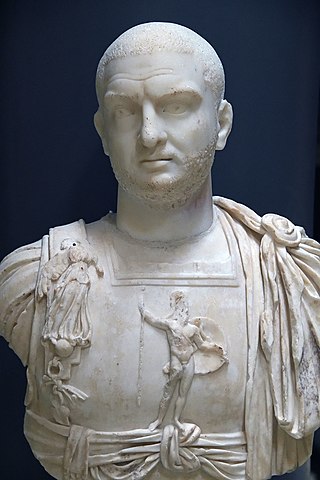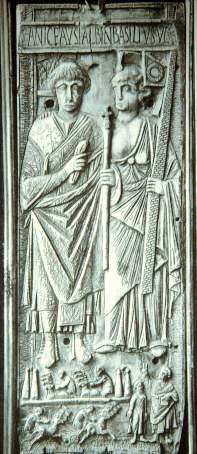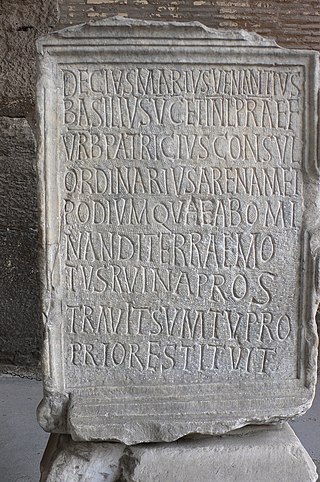Related Research Articles

Gaius Vibius Trebonianus Gallus was Roman emperor from June 251 to August 253, in a joint rule with his son Volusianus.

A consul was the highest elected public official of the Roman Republic. Romans considered the consulship the second-highest level of the cursus honorum—an ascending sequence of public offices to which politicians aspired—after that of the censor, which was reserved for former consuls. Each year, the Centuriate Assembly elected two consuls to serve jointly for a one-year term. The consuls alternated each month holding fasces when both were in Rome. A consul's imperium extended over Rome and all its provinces.

The mayor of Rome is an elected politician who, along with the Rome City Council of 48 members, is accountable for the strategic government of Rome. As Rome is a comune speciale since 2009, the office is different from the offices of the other Italian cities. The title is the equivalent of Lord Mayor in the meaning of an actual executive leader.

Anicius Faustus Albinus Basilius was a high official of the Eastern Roman Empire and the last ordinary consul of Roman history, holding the office alone in 541.

The praetorian prefecture of Italy was one of four praetorian prefectures into which the Late Roman Empire was divided. It comprised the Italian peninsula, the Western Balkans, the Danubian provinces and parts of North Africa. The Prefecture's seat moved from Rome to Milan and finally, Ravenna.
The gens Decia was a plebeian family of high antiquity, which became illustrious in Roman history by the example of its members sacrificing themselves for the preservation of their country. The first of the family known to history was Marcus Decius, chosen as a representative of the plebeians during the secession of 495 BC.
Vettius Agorius Basilius Mavortius was a Roman aristocrat who lived during Ostrogothic rule. He was appointed consul for 527.
Caecina Decius Basilius was a politician of the Western Roman Empire, Consul and twice Praetorian prefect of Italy.
The gens Anicia was a plebeian family at ancient Rome, mentioned first towards the end of the fourth century BC. The first of the Anicii to achieve prominence under the Republic was Lucius Anicius Gallus, who conducted the war against the Illyrians during the Third Macedonian War, in 168 BC.
Caecina Mavortius Basilius Decius was a Roman politician under Odoacer's rule. He was consul and Praefectus urbi of Rome in 486 and Praetorian prefect of Italy from 486 to 493.
Gennadius Avienus was an influential politician of the Western Roman Empire. He was consul in 450, alongside Valentinian III. In 452, he was an envoy to Attila; together with Pope Leo I and Trigetius he successfully negotiated a truce. He had a son and a daughter; his son would go on to be consul in 490.

(Caecina) Decius Marius Venantius Basilius was a Roman official under Odoacer's rule.
(Decius) Basilius Venantius, was a Roman aristocrat who lived during Ostrogothic rule.
Decius was a politician of the Eastern Roman Empire. A member of the Decia gens, he was appointed consul for 529 without colleague.
Caecina Decius AginatiusAlbinus was an aristocrat of the Roman Empire. He was praefectus urbi in 414, succeeding his friend Rutilius Namatianus, and possibly again in 426.
Flavius Avienus was a Roman politician during the reign of Theodoric the Great. He held the consulship with Pompeius as colleague in 501.
Rufius Petronius Nicomachus Cethegus was a politician of Ostrogothic Italy and the Eastern Roman Empire. He was appointed consul for 504 AD, and held the post without a colleague. His father was Petronius Probinus, the consul for 489 and prominent supporter of Antipope Laurentius.
Caecina Decius Faustus Albinus was a Roman politician during the reign of Theodoric the Great. He held the consulship with Eusebius in 493. Albinus is best known for being identified with the senator whom Boethius defended from accusations of treasonous correspondence with the Eastern Roman Empire by the referandarius Cyprianus, only to have Cyprianus then accuse Boethius of the same crime.
Rufius Postumius Festus was a Roman aristocrat who lived during the Late Roman Empire. Festus was the last consul appointed by an Emperor in the West. The next consul appointed in the West was Caecina Decius Maximus Basilius, whom king Odoacer appointed in 480, eight years after Festus.
References
- 1 2 Jones, A.H.M.; Martindale, J. R.; Morris, John, eds. (1992). "(Decius) Paulinus". Prosopography of the Later Roman Empire . Vol. III. pp. 973–974. ISBN 9780521072335.
- ↑ Cameron, A.; Schauer, D. (1982). "The Last Consul: Basilius and His Diptych". The Journal of Roman Studies . 72: 128.
- ↑ Cassiodorus, Variae epistolae, IX, 22
- ↑ Bagnall, Roger S.; Cameron, Alan; Schwartz, Seth R.; Worp, Klaas A. (1987). Consuls of the Later Roman Empire. Philological Monographs No. 36. American Philological Association. pp. 602–603. ISBN 1-55540-099-X.